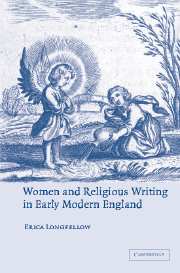Book contents
- Frontmatter
- Contents
- Acknowledgements
- Abbreviations
- Note on transcription and citation
- Introduction
- 1 ‘Blockish Adams’ on mystical marriage
- 2 Ecce homo: the spectacle of Christ's passion in Salve deus rex judæorum
- 3 Serpents and doves: Lady Anne Southwell and the new Adam
- 4 Public worship and private thanks in Eliza's babes
- 5 Anna Trapnel ‘sings of her Lover’
- 6 The transfiguration of Colonel Hutchinson in Lucy Hutchinson's elegies
- Conclusion
- Bibliography
- Index
- Index to scripture passages
Conclusion
Published online by Cambridge University Press: 22 September 2009
- Frontmatter
- Contents
- Acknowledgements
- Abbreviations
- Note on transcription and citation
- Introduction
- 1 ‘Blockish Adams’ on mystical marriage
- 2 Ecce homo: the spectacle of Christ's passion in Salve deus rex judæorum
- 3 Serpents and doves: Lady Anne Southwell and the new Adam
- 4 Public worship and private thanks in Eliza's babes
- 5 Anna Trapnel ‘sings of her Lover’
- 6 The transfiguration of Colonel Hutchinson in Lucy Hutchinson's elegies
- Conclusion
- Bibliography
- Index
- Index to scripture passages
Summary
Among the numerous seventeenth-century verse paraphrases of the Song of Songs is one by Barbara Mackay, Lady Scourie (fl. 1657), a Highland Scotswoman. Her translation is prefaced with the following poem:
O Song off Songs o Song most pretious rare
To speak off the let no song elss compare
O Song that Superlatively exceed
All can be said o sweet song that feed
With Heavnly raptures with inchanted Stoūnds
Off love-sick flames, it both charmes and wounds
The soul that reads it, fixing all its darts
Within the centre off all Heavnly hearts
For majesty, let non with it compare
For melodie it is exceeding rare
For harmonie it is all one intire
For puritie it is the truth most pure
It ravisheth, it captivates, it charmes
All sound affections in the beloveds armes
This sweet dealgoue that point out the Love
Betwixt the creature and his Lord above
No wonder though the wisest off all men
Were chois'd to dip in the his sacred pen
No wonder though his name to this accord
[For] he was born beloved off the Lord
Come then sweet singer with thy heavnly Song
For I intend to heare you all a Long[.]
Like many other translators and commentators, Barbara Mackay's poem plays on the Hebrew title of the Song of Songs, which can be read ‘song above all other songs’ or, as she puts it, ‘Song most pretious rare’.
- Type
- Chapter
- Information
- Women and Religious Writing in Early Modern England , pp. 209 - 216Publisher: Cambridge University PressPrint publication year: 2004



